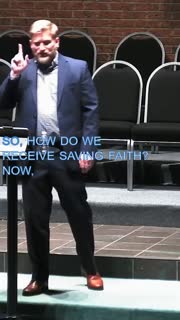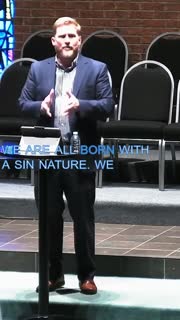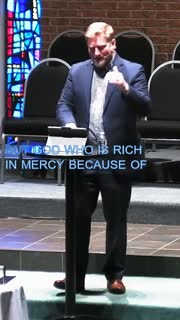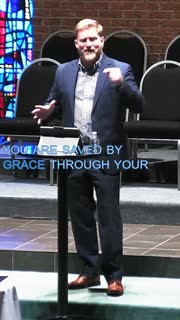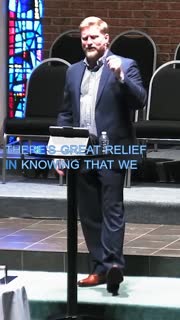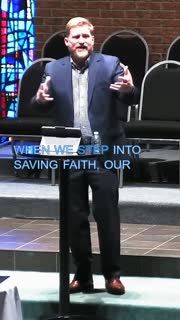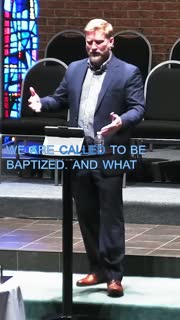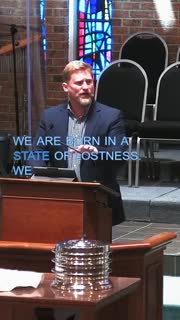Embracing Saving Faith: Grace, Transformation, and Response
Summary
In today's gathering, we explored the profound concept of saving faith, a cornerstone of our Christian belief. We delved into Ephesians 2:4-10, a passage that beautifully encapsulates the essence of grace and faith. The journey of faith begins with understanding our inherent state of lostness and sinfulness, a condition we are born into due to the fall of humanity. This state is characterized by spiritual death, disobedience, and a natural inclination to follow worldly desires and spiritual forces opposed to God.
However, the narrative doesn't end in despair. The pivotal moment comes with the phrase "But God," highlighting His rich mercy and great love. Despite our sinful nature, God, in His grace, makes us alive with Christ. This transformation is not a result of our works but a gift from God, emphasizing that salvation is by grace through faith. This faith is not something we can generate on our own; it is imparted to us by God, drawing us to Him and filling us with His Spirit.
The process of receiving saving faith involves several divine actions: the Father draws us, the Spirit fills us, and the message of the Gospel is shared with us. Our response to this divine initiative is crucial. We are called to repent, be baptized, declare Jesus as Lord, and engage in good works. These actions are not means to earn salvation but are expressions of the faith that God has graciously given us.
As we partake in communion, we remember and celebrate this gift of saving faith. It is a time to acknowledge our faith, proclaim Jesus as Lord, and commit to living a life that reflects His love and grace. Communion serves as a reminder of the covenant of grace, a sign and seal of our faith, and an opportunity to renew our commitment to Christ.
Key Takeaways:
- Understanding Our State of Lostness: We are born into a state of sin and spiritual death, naturally inclined to follow worldly desires and spiritual forces opposed to God. Recognizing this condition is the first step toward understanding the need for saving faith. [38:40]
- The Gift of Grace: Salvation is a gift from God, not a result of our works. It is by grace through faith that we are saved, highlighting the unmerited favor of God and His rich mercy towards us. [46:05]
- The Divine Process of Faith: The Father draws us, the Spirit fills us, and the Gospel is shared with us. This divine process emphasizes that faith is not self-generated but imparted by God, leading us to a transformative relationship with Him. [53:24]
- Our Response to Faith: We are called to repent, be baptized, declare Jesus as Lord, and engage in good works. These actions are expressions of the faith we have received, demonstrating our commitment to live a life centered on Christ. [58:23]
- Communion as a Celebration of Faith: Communion is a time to remember and celebrate the gift of saving faith. It is a sign and seal of our covenant with God, reminding us of the grace we have received and our commitment to live out our faith. [01:03:49]
Youtube Chapters:
- [0:00] - Welcome
- [35:01] - Introduction to Communion
- [35:49] - Engaging Faith Series
- [36:48] - Reading Ephesians 2:4-10
- [37:46] - Understanding Saving Faith
- [38:40] - Humanity's State of Lostness
- [39:40] - Spiritual Forces and Fleshly Desires
- [42:05] - The Fall and Sin Nature
- [44:10] - God's Rich Mercy
- [46:05] - Saved by Grace Through Faith
- [50:03] - The Inability to Seek God
- [51:13] - Faith as a Gift from God
- [53:24] - The Process of Receiving Faith
- [58:23] - Responding to Faith: Repentance and Baptism
- [01:03:49] - Communion and the Apostles' Creed
Study Guide
Bible Study Discussion Guide
Bible Reading:
- Ephesians 2:4-10
---
Observation Questions:
1. According to Ephesians 2:4-10, what are the key elements that describe God's intervention in our state of sinfulness?
2. How does the sermon describe the state of humanity before receiving saving faith? ([38:40])
3. What role does the phrase "But God" play in the transformation described in Ephesians 2:4-10?
4. What actions are believers called to take in response to receiving saving faith, as mentioned in the sermon? ([58:23])
---
Interpretation Questions:
1. How does the concept of "saving faith" differ from other types of faith mentioned in the Bible, according to the sermon? ([37:46])
2. In what ways does the sermon suggest that our good works relate to our salvation? ([48:09])
3. How does the sermon explain the process by which God imparts saving faith to individuals? ([53:24])
4. What is the significance of communion as a celebration of faith, as discussed in the sermon? ([01:03:49])
---
Application Questions:
1. Reflect on your own life: How do you recognize the state of lostness described in the sermon before you came to faith? ([38:40])
2. The sermon emphasizes that salvation is a gift from God. How does this understanding affect your view of your own efforts and achievements? ([46:05])
3. Consider the divine process of faith described in the sermon. How have you experienced the Father drawing you or the Spirit filling you in your faith journey? ([53:24])
4. The sermon calls believers to engage in good works as an expression of faith. What specific good work can you commit to this week as a demonstration of your faith? ([58:23])
5. Communion is a time to remember and celebrate saving faith. How can you prepare your heart and mind to partake in communion meaningfully? ([01:03:49])
6. The sermon discusses the importance of declaring Jesus as Lord. What areas of your life need to be more aligned with this declaration? ([01:00:38])
7. How can you share the message of the Gospel with someone in your life this week, as part of the divine process of faith? ([56:00])
Devotional
I'm ready to provide the 5-day devotional based on the steps outlined. Here it is:
---
Day 1: Recognizing Our Spiritual Condition
Understanding our inherent state of lostness is crucial in the journey of faith. We are born into a condition of sin and spiritual death, naturally inclined to follow worldly desires and spiritual forces opposed to God. This realization is the first step toward acknowledging our need for saving faith. It is only by recognizing our spiritual condition that we can truly appreciate the depth of God's grace and the necessity of His intervention in our lives. This understanding leads us to a place of humility and openness to the transformative power of faith. [38:40]
Ephesians 5:8-10 (ESV): "For at one time you were darkness, but now you are light in the Lord. Walk as children of light (for the fruit of light is found in all that is good and right and true), and try to discern what is pleasing to the Lord."
Reflection: In what areas of your life do you still find yourself following worldly desires? How can you begin to turn away from these and seek God's light today?
Day 2: Embracing the Gift of Grace
Salvation is a profound gift from God, not a result of our works. It is by grace through faith that we are saved, highlighting the unmerited favor of God and His rich mercy towards us. This grace is a testament to God's love, offering us a path to redemption despite our sinful nature. Embracing this gift requires us to let go of the notion that we can earn our way to salvation and instead, rest in the assurance of God's grace. It is a call to live in gratitude and humility, recognizing that our salvation is a divine gift. [46:05]
Titus 3:4-7 (ESV): "But when the goodness and loving kindness of God our Savior appeared, he saved us, not because of works done by us in righteousness, but according to his own mercy, by the washing of regeneration and renewal of the Holy Spirit, whom he poured out on us richly through Jesus Christ our Savior, so that being justified by his grace we might become heirs according to the hope of eternal life."
Reflection: How can you express gratitude for God's grace in your daily life? What specific actions can you take to live out this gratitude today?
Day 3: Participating in the Divine Process of Faith
The journey of faith is initiated by God, who draws us to Himself. The Father draws us, the Spirit fills us, and the Gospel is shared with us. This divine process emphasizes that faith is not self-generated but imparted by God, leading us to a transformative relationship with Him. Our role is to be receptive to this divine initiative, allowing God's Spirit to work within us and transform our hearts and minds. This process is a reminder of God's active presence in our lives, guiding us towards a deeper understanding and experience of faith. [53:24]
John 6:44-45 (ESV): "No one can come to me unless the Father who sent me draws him. And I will raise him up on the last day. It is written in the Prophets, 'And they will all be taught by God.' Everyone who has heard and learned from the Father comes to me."
Reflection: How can you be more open to the work of the Holy Spirit in your life? What steps can you take to actively participate in the divine process of faith today?
Day 4: Responding to Faith with Action
Our response to the gift of faith is crucial. We are called to repent, be baptized, declare Jesus as Lord, and engage in good works. These actions are not means to earn salvation but are expressions of the faith we have received, demonstrating our commitment to live a life centered on Christ. This response is an outward manifestation of an inward transformation, reflecting our desire to align our lives with God's will. It is a call to live out our faith in tangible ways, serving others and glorifying God through our actions. [58:23]
James 2:17-18 (ESV): "So also faith by itself, if it does not have works, is dead. But someone will say, 'You have faith and I have works.' Show me your faith apart from your works, and I will show you my faith by my works."
Reflection: What is one specific way you can demonstrate your faith through action today? How can you serve others and glorify God in your daily life?
Day 5: Celebrating Faith Through Communion
Communion is a time to remember and celebrate the gift of saving faith. It is a sign and seal of our covenant with God, reminding us of the grace we have received and our commitment to live out our faith. As we partake in communion, we acknowledge our faith, proclaim Jesus as Lord, and commit to living a life that reflects His love and grace. This sacred practice serves as a reminder of the covenant of grace and an opportunity to renew our commitment to Christ, drawing us closer to Him and to one another in the body of Christ. [01:03:49]
1 Corinthians 10:16-17 (ESV): "The cup of blessing that we bless, is it not a participation in the blood of Christ? The bread that we break, is it not a participation in the body of Christ? Because there is one bread, we who are many are one body, for we all partake of the one bread."
Reflection: How can you prepare your heart and mind to fully participate in communion? What does it mean for you to renew your commitment to Christ through this sacred practice today?
---
Quotes
1. "So, how do we receive saving faith? Now, I wanted to make it clear that I said saving faith versus just faith, because there is a difference. There's saving faith, and then there's like the faith that moves mountains, right? And so there's two different types of faith that we're talking about when we talk about Scripture. Today, I'm talking about saving faith. In other words, how do I become a Christian? Really, that is what it means to receive saving faith. And so, that's what we're talking about today." [37:46] (32 seconds)
2. "We are all born with a sin nature. We are all born with an inclination to follow after the flesh and born with a sin nature. We are all born with the inclination to be influenced by the powers of sin, powers of the air, the spiritual forces that are at work in us. And then Psalms 51 makes it very clear, the state that we're born in. Psalms 51.5 says this, In other words, right from the moment we were conceived in our mother's womb, we were sinful. We were lost. We were lost in need of being found." [42:43] (43 seconds)
3. "But God, who is rich in mercy because of his great love for us. I mean, this is an exciting passage of scripture. But God is rich in mercy, even though that we were worthy of death because we follow after the flesh. But God is rich in mercy. And what he does is he provides a way of, of escape from the penalty, the wages of what sin is. Because we know when we read in Romans throughout the book, we know that it tells us that all have sinned and come short of the glory of God." [44:10] (33 seconds)
4. "You are saved by grace through your faith. And so when we receive saving faith, now grace is imparted onto us. And this is not something that comes from yourselves. You see, there's a lot of people that are out there that believe that if we just try hard enough, if we do all the right things, then we can do what it takes to be saved. But what the scripture tells us right here is that there is nothing that we can do in and of ourselves that brings us to this place of saving faith." [46:05] (29 seconds)
5. "There's great relief in knowing that we are not responsible for our salvation, nor the salvation of others. We simply plant and water, but God gives the increase. It's a great relief to know this because sometimes we feel so much pressure that it's up to us to save the world. I see online often, you know, there's all these arguments that you see on social media. You see it a lot on Twitter, this argument about faith and people that are deconstructing and falling away from God." [56:00] (31 seconds)
6. "When we step into saving faith, our destiny is that with Christ. It's talking about our destiny here that now that we're married with Christ, what it looks like. We are raised with Christ. We're seated on the right hand with Christ. We are in the heavens with Christ so that in the coming ages, he might display the immeasurable riches of his grace through his kindness in Christ Jesus. Talking about the work that Christ does for us. This is all the things that Christ is doing for us, preparing us to receive faith." [45:26] (36 seconds)
7. "We are called to be baptized. And what is baptism? Well, baptism is simply this. It's a sign and a seal of the covenant of grace. So what do I mean by that? A sign and a seal. Well, a sign, you know that somebody's a believer. Well, for instance, you drive down the road and you see a McDonald's sign that tells you that there is a McDonald's there. And when you pull in, that's telling you this is McDonald's. It's the same thing with our faith. When we are baptized, it's saying, I am a believer." [59:16] (30 seconds)
8. "We are born in a state of lostness. We are born with a nature of sin. We are born into what we call depravity. Depravity meaning that we have no desire for the things of God. We have no desire in and of ourselves to follow after the things of God. And that is the condition in which we were born. So how can we be saved if there is nothing within us that desires anything to do with God? Well, I'm going to tell you." [02:25:27] (28 seconds)
